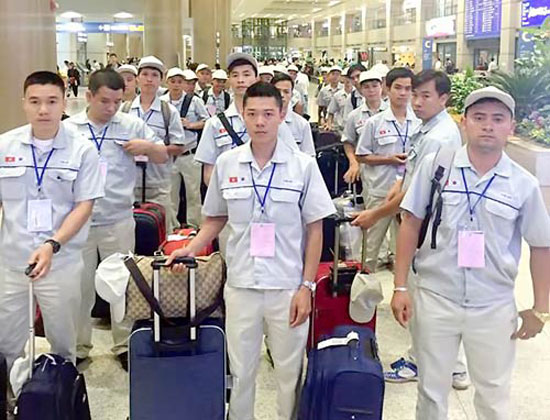ILO: Labour migration should be a safe choice
Cập nhật: 02/12/2019 11:23


The ILO reiterates its commitment to enabling rights-based governance of labour migration.
Press release | 29 October 2019
HANOI, Viet Nam (ILO News) – The International Labour Organization (ILO) in Viet Nam calls for increased efforts to ensure labour migration is accessible, safe, orderly and regular.
The ILO reiterates its commitment to enabling rights-based governance of labour migration.
“With collaboration and cooperation, labour migration can be a positive development force, and risks to the safety of migrant workers can be reduced,” says ILO Viet Nam Director, Chang-Hee Lee. “When migrant workers’ rights are respected, and their journeys are safe, they themselves, families, societies can benefit from remittances and improved skills.”
Viet Nam has a growing number of people going abroad for work, with approximately 142,000 contract-based workers, including 50,000 women, departing in 2018 and migrant workers sending home US$2.5-3 billion annually, according to Government estimates. Reports also show increasing irregular migration within the region and to Europe.
Irregular labour migration refers to the movement of persons outside the laws, regulations or international agreements governing the entry or exit from the country of origin, transit or destination.
“Irregular labour migration increases migrant workers’ vulnerability to exploitation, and limits the channels available to them to seek assistance and justice while abroad, as well as rendering them vulnerable to punishment by fines and other sanctions in Viet Nam,” says the ILO Viet Nam Director.
The ILO strongly recommends improving regular migration channels to reduce cost and complexity and hence increase access to regular migration. The ILO stands by the principle adopted in the Private Employment Agencies Convention 1997 (No. 181) and the Protocol of 2014 to the Forced Labour Convention 1930 (No. 29) that workers, in particular migrant workers, should be protected from abusive and fraudulent recruitment practices. Debts related to migration exacerbate the risk of human trafficking and forced labour. Migrant workers should therefore not bear any recruitment fees or related costs.
“When migrant workers’ rights are respected, and their journeys are safe, they themselves, families, societies can benefit from remittances and improved skills."
Chang-Hee Lee, ILO Viet Nam Director
A recent joint study by the ILO and the International Organization of Migration (IOM) found that migrant workers have limited ability to control whether they have a positive or negative migration experience, regardless of the decisions they make. To a great extent, improving the odds of a positive outcome requires changes to policy and practice by duty bearers – governments, employers, recruitment agencies, and trade unions – rather than to the behaviour of migrant workers.
The same study also revealed that Vietnamese migrant workers paid the highest migration costs in the region. They also had to borrow the largest amounts and took the longest time – up to 11 months – to pay back their loans. Over three-quarters of Vietnamese migrant workers interviewed (75 per cent women and 77 per cent men) reported experiencing labour rights abuses while working abroad.
Recommendations
The Government of Viet Nam is currently reviewing the foundational law governing the migration of Vietnamese citizens overseas and has a crucial opportunity to improve the framework around labour migration, and make regular migration channels more attractive.
The ILO calls on governments to step up efforts to support migrant workers by:
- Strengthening cooperation among countries of origin, transit and destination to increase and safeguard regular migration options, especially for women, to meet the need for decent work – dialogue and coordination with countries facing labour shortages to regularize the migration of workers and provide job opportunities.
- Developing regular migration channels that are less costly, less time consuming and less complex – though regular migration can increase the chances of a positive and profitable migration, the benefits are diminished when costs for regular migration are too high and take too long, pushing potential migrants into more easily accessible routes, including through brokers.
- Shifting the costs paid for migration from workers to employers – the substantial debt that migrant workers take on to pay for recruitment reduces their returns on migration and can even put them at risk for losing their homes and land. At the 2019 Governing Body meeting, ILO defined the terms ‘recruitment fees’ and ‘related costs’ as any fees or costs incurred in the recruitment process in order for workers to secure employment or placement, regardless of the manner, timing or location of their imposition or collection. Under the ILO’s General principles and operational guidelines for fair recruitment, no recruitment fees or related costs should be charged to workers or jobseekers.
- Expanding access to justice for migrant workers, particularly women migrant workers who often face additional obstacles, at home and abroad – the ability of migrant workers to access complaint mechanisms when faced with abuses during recruitment and employment is vital for providing fair and responsive remedies.
- Providing skills training that matches with employer requirements and does not create an additional burden on the time and resources of migrant workers – benefits both employers and migrants, contributing to increased productivity and better wages and working conditions.
- Expanding the services provided to migrant workers and their families to assist with return and reintegration – to ensure that women and men migrant workers successfully reintegrate socially and economically and do not face the same challenges finding employment when they return to Viet Nam.
Note to the editors
The ILO recommends using the terms “labour migration”, “labour movement” or “labour mobility” instead of “labour export” as labour is not a commodity.
“Irregular migrant workers”, “migrant workers with irregular status” or “undocumented migrant workers” should also be used instead of “illegal migrant workers”.
Your support of using rights-based language can prevent discrimination against irregular migrant workers and promote social inclusion.